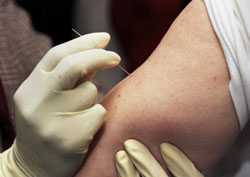Smallpox Vaccine Guidance
When properly administered before exposure to monkeyox, smallpox vaccine is effective at protecting people against monkeypox .
Smallpox vaccine is made from live vaccinia virus, a virus closely related to variola virus (smallpox).
The current licensed vaccine available in the United States is ACAM2000®. ACAM2000 is administered as a live virus preparation that is inoculated into the skin by pricking the skin surface.
Following a successful inoculation, a lesion will develop at the site of the vaccination. The virus growing at the site of this inoculation lesion can be spread to other parts of the body or even to other people. Individuals who receive vaccination with ACAM2000 must take precautions to prevent the spread of the vaccine virus.
CDC, in conjunction with the Advisory Committee on Immunization Practices (ACIP), provides recommendations on who should receive smallpox vaccination in a non-emergency setting. At this time, vaccination is recommended for laboratorians working with certain orthopoxviruses and military personnel.
Vaccine Effectiveness

Smallpox vaccine is effective at protecting people against monkeypox when given before exposure to monkeypox. Experts also believe that vaccination after a monkeypox exposure may help prevent the disease or make it less severe.
Because monkeypox virus is closely related to the virus that causes smallpox, the smallpox vaccine can protect people from getting monkeypox. Past data from Africa suggests that the smallpox vaccine is at least 85% effective in preventing monkeypox.
Smallpox vaccine is effective at protecting people against monkeypox when given before exposure to monkeypox. Experts also believe that vaccination after a monkeypox exposure may help prevent the disease or make it less severe.
Receiving Vaccine After Exposure to Monkeypox Virus
Smallpox vaccination after exposure to monkeypox virus is still possible. However, the sooner an exposed person gets the vaccine, the better.
CDC recommends that the vaccine be given within 4 days from the date of exposure in order to prevent onset of the disease. If given between 4–14 days after the date of exposure, vaccination may reduce the symptoms of disease, but may not prevent the disease.
Revaccination After Exposure
Persons exposed to monkeypox virus and who have not received the smallpox vaccine within the last 3 years, should get the smallpox vaccine.
The sooner the person receives the vaccine, the more effective it will be in protecting against monkeypox virus.
Smallpox Vaccine Risks vs. Monkeypox Disease
For most persons who have been exposed to monkeypox, the risks from monkeypox disease are greater than the risks from the smallpox vaccine.
Monkeypox is a serious disease. It causes fever, headache, muscle aches, backache, swollen lymph nodes, a general feeling of discomfort, exhaustion, and severe rash. Studies of monkeypox in Central Africa—where people live in remote areas and are medically underserved—showed that the disease killed 1–10% of people infected.
In contrast, most people who get the smallpox vaccine have only minor reactions, like mild fever, tiredness, swollen glands, and redness and itching at the place where the vaccine is given. However, the smallpox vaccine does have more serious risks, too.
Based on past experience, it is estimated that between 1 and 2 people out of every 1 million people vaccinated will die as a result of life-threatening complications from the vaccine.
- Page last reviewed: May 11, 2015
- Page last updated: May 11, 2015
- Content Source:


 ShareCompartir
ShareCompartir